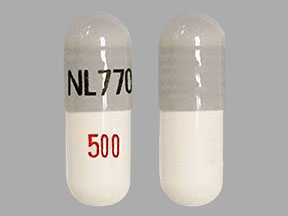Flucytosine Disease Interactions
There are 4 disease interactions with flucytosine.
Flucytosine (applies to flucytosine) myelosuppression
Major Potential Hazard, High plausibility. Applicable conditions: Bone Marrow Depression/Low Blood Counts, Immunodeficiency
Flucytosine may frequently cause bone marrow toxicity, which can be irreversible and fatal in immunosuppressed patients. Flucytosine should be used with extreme caution in patients with preexisting bone marrow suppression. Frequent blood counts are recommended.
Flucytosine (applies to flucytosine) renal dysfunction
Major Potential Hazard, High plausibility.
Flucytosine must be given with extreme caution to patients with impaired renal function. Flucytosine is excreted primarily by the kidneys, and renal impairment may lead to accumulation of the drug. Serum concentrations of the drug should be monitored to determine the adequacy of renal excretion in such patients. Dosage adjustments should be made in patients with renal insufficiency to prevent progressive accumulation of active drug. Close monitoring of renal, hematologic and hepatic function in all patients is recommended.
Flucytosine (applies to flucytosine) hemodialysis
Moderate Potential Hazard, High plausibility.
Flucytosine is substantially removed by hemodialysis and should be administered after dialysis.
Flucytosine (applies to flucytosine) hypokalemia
Moderate Potential Hazard, Moderate plausibility.
Flucytosine may cause hypokalemia. Patients with preexisting hypokalemia should be monitored closely for worsening electrolyte disturbances during therapy with flucytosine.
Switch to professional interaction data
Flucytosine drug interactions
There are 117 drug interactions with flucytosine.
More about flucytosine
- flucytosine consumer information
- Check interactions
- Compare alternatives
- Pricing & coupons
- Drug images
- Side effects
- Dosage information
- During pregnancy
- Drug class: miscellaneous antifungals
- En español
Related treatment guides
Drug Interaction Classification
| Highly clinically significant. Avoid combinations; the risk of the interaction outweighs the benefit. | |
| Moderately clinically significant. Usually avoid combinations; use it only under special circumstances. | |
| Minimally clinically significant. Minimize risk; assess risk and consider an alternative drug, take steps to circumvent the interaction risk and/or institute a monitoring plan. | |
| No interaction information available. |
See also:
Further information
Always consult your healthcare provider to ensure the information displayed on this page applies to your personal circumstances.


